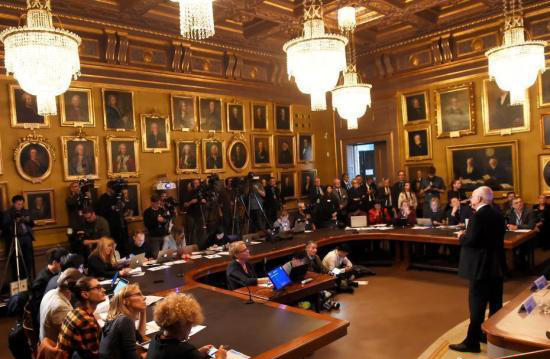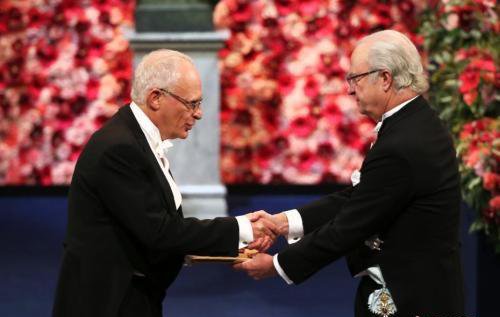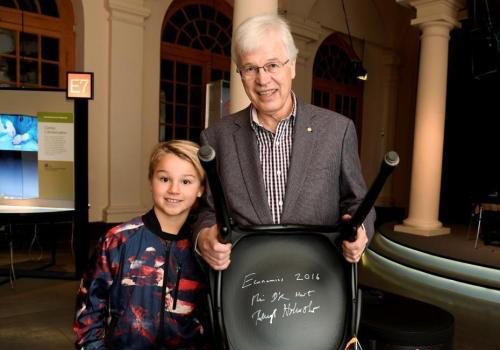


The Nobel Prize in economics is an award set up by the National Bank of Sweden in memory of Alfred Nobel, also known as the Swedish bank economics award.
The Nobel Prize in economics is not established according to the will of Alfred Nobel, but it is similar to the Nobel Prize in the selection process and awarding ceremony. Since 1968, the awards have been presented annually by the Royal Swedish Academy of Sciences, following the principle of making the greatest contribution to human interests. In 1969 (at the 300th anniversary of the establishment of the National Bank of Sweden), the first prize was awarded by the Norwegian Frisch and the Dutch Jan timberghan. American economists Samuelson and Friedman all won the prize.
On October 8, 2018, Paul Romer and William Nordhaus won the Nobel Prize in economics for their outstanding contributions to innovation, climate and economic growth.
2018
Two thousand and eighteen
Two American economists William Nordhaus and Paul Romer became Nobel laureates this year when the 2018 Nobel Prize in economics was announced. According to the Nobel Prize Committee, they have integrated climate change and technological innovation into long-term macroeconomic research.
Paul Romer and his academic contribution
Paul Michael Romer
American economist, Professor of Stanford University, one of the main founders of the new growth theory, is regarded as an expert in economic growth.
Paul Romer received his B.A. in physics from the University of Chicago in 1977 and his Ph.D. in economics from the University in 1983. He was chosen by time magazine as one of the 25 most influential people in the United States in 1997. In October 2016, Paul Romer took the post of chief economist of the world bank and resigned in January 2018.
Academic contribution
Paul Romer's most important work is in the field of economic growth. He majored in mathematics and physics at the University of Chicago. Because he wanted to transfer to law school, he took his first economics course in the fourth year of the University. Sam Peltzman, the lecturer, was deeply attracted by his wonderful lecture on economics. Under the influence and encouragement of perlzman, Romer gave up the idea of learning law and went to the way of economics. After graduating from University, he transferred to MIT for his Ph.D. and began to study the theory of economic growth at that time. He returned to the University of Chicago in 1982 and received his Ph.D. from the University of Chicago in 1983. He has served as assistant professor of the University of Rochester, Professor of the University of Chicago and professor of the University of California, Berkeley. Now he is Professor of economics of Stanford University and senior researcher of Hoover Institute.
Romer established the endogenous economic growth model in 1986, and integrated knowledge into the economic and technological system, making it the endogenous variable of economic growth. Romer put forward four factor growth theory, that is, capital and labor (non-technical labor) in neoclassical economics, plus human capital (measured by years of Education) and new ideas (measured by patents, emphasizing innovation).
The main founders of the new growth theory are Romer (1986) and Robert Lucas (1988). This paper discusses some possible ways to correct the limitations of the new classical economic growth model, and explains the economic growth with endogenous technology. The main idea of this theory was first embodied in Romer's doctoral dissertation in 1983, published in the Journal of political economy in 1986, and put forward the "endogenous economic growth theory", which explored some possible ways to correct the limitations of the neoclassical economic growth model, and aroused the interest of the economic circle in the economic growth theory.
At the annual meeting of development economics of the world bank in 1992, Romer further applied the above ideas to the study of development strategies of developing countries and regions, and believed that whether more creative or knowledge products can be provided and used will directly affect whether a country or region's economy can maintain long-term growth. For example, Mauritius implemented an opening-up policy in the 1970s and 1980s, which attracted Hong Kong entrepreneurs to apply new ideas and knowledge products there, thus driving the country's economic development and getting rid of extreme poverty.
Winner William Nordhaus and his academic contribution
William D. Nordhaus
William D. Nordhaus: born in Albuquerque, New Mexico, graduated from Yale University with a bachelor's degree. He received his Ph.D. in economics from MIT in 1967 and studied under Paul Samuelson and Robert Thoreau. He has been teaching at Yale since 1967 and was hired as a tenured professor in 1973. At present, he is Professor of economics at Yale University and director of the Coles foundation for economic research. Professor Nordhaus teaches the principles of economics at Yale University. Nordhaus is one of the 50 most influential economists in the United States and one of the top analysts in global research on climate change economics.
Academic contribution
Nordhaus has a wide range of economic research, including environmental, price, energy, technological change, economic growth, profit and productivity growth trends. Main research fields: growth economics, wages and prices, ecological management economics, transformation economics.
Professor Nordhaus has published a large number of articles in professional journals in many research fields. His research focuses on the constraints of economic growth. He is one of the top analysts in global climate change economics. He urged a shift from an emissions licensing system to a carbon tax. Since the 1970s, he has developed economic methods to study global warming, including the construction of integrated economic and scientific models (dice and rice models), which provides an effective way to deal with climate change.
Professor Nordhaus also studied wage and price behavior, expanded national income and production accounting, political business week, productivity, the cost and benefits of regulation, and the "new economy.". He also has research on the transition economy. He is very interested in economic reform newspapers in China, Eastern Europe and the former Soviet Union.

Infographic: Nobel laureate announces the scene.
2017
Richard Taylor, an American economist, won a prize for his contribution to behavioral economics. Taylor integrated the realistic hypothesis of psychology into the decision analysis of economics. He studies and explores the consequences of limited rationality, social preferences, and lack of control, and shows how these human traits affect individual decisions and thus market effects.
2016
Oliver hart of Harvard University and Bennett horstrom of MIT won the Nobel Prize in economics for their contributions to contract theory. The analysis of the optimal contract arrangement by the two economists improved the formulation of many policies and systems.
2015
Angstrom Deaton, an economist with British and American citizenship, won the Nobel Prize for his research on consumption, poverty and welfare. Angus Deaton's main academic contribution is to provide a tool to measure the level of family welfare quantitatively, so as to define and measure poverty more accurately, which is of great significance for making more effective anti-poverty policies.

Information chart: King Carl XVI Gustav (right) of Sweden presented the 2016 Nobel Prize in economics to Oliver Hart.
2014
Jean tiroer, a French economist known as a "genius economist", won the prize for his contribution to the research of market power and regulation, breaking the phenomenon of monopoly economics award of American economists for many years. Tiroer has made pioneering contributions to the game theory, industrial organization theory and incentive theory in the three most cutting-edge research fields of contemporary economics.
2013
American economists Eugene Fama, Lars Peter Hansen and Robert Schiller won awards for their remarkable achievements in empirical analysis of asset prices. The selection committee pointed out that their research results lay the foundation for people's current understanding of asset prices. Asset prices rely on volatility risk and risk attitude on the one hand, and on the other hand are related to behavioral deviation and market friction.
2012
The Nobel Prize in economics was awarded to American economists Alvin Roth and Lloyd Shapley for their contributions to "stable matching theory and market design practice". Shapley's research focuses on how to make the two sides unwilling to break the current matching state, so as to maintain the matching stability. Through a series of research, Roth found that "stability" is the key factor to understand the success of specific market mechanism

Photo: Holmstrom, one of the winners of the 2016 Nobel Prize in economics, signs his name on the chair of the Nobel Museum.
2011
Christopher Simms of Princeton University and Thomas Sargent of New York University won the prize. Sims studies the role of short-term economic policies, reflecting his concern about the effect of macro policies. As the leader of the rational expectation school, Sargent has made great achievements in the research fields of the role of expectation in the macroeconomic model, the relationship between dynamic economic theory and time series analysis.
2010
Peter Diamond and dale Mortensen, American economists, and Christopher Pissarides, an economist with dual nationality of Britain and Cyprus, won the prize for their analysis of the theory of "how economic policies affect unemployment rate". The theory of three people can explain economic phenomena such as "why there are still many people out of work when there are many job vacancies". The economic model created by the Trio also helps to understand "how regulations and economic policies affect unemployment, job vacancies and wages".
2009
American economists Eleanor Ostrom and Oliver Williamson won the prize for their excellent analysis of economic management behavior. Ostrom's research reveals how user organizations manage public resources effectively. Williamson's research has developed the theory of companies as some structural arrangements to solve conflicts of interest.
2008
Paul Krugman, the American economist who won the prize, integrated the previous research on international trade and geoeconomics, and formed a set of theories on free trade, globalization and the motivation of promoting the process of urbanization around the world. His new theory can help to explain the impact of free trade and globalization on the world economy and the driving force of urbanization worldwide.
